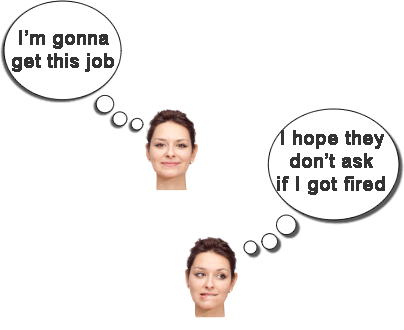- POPULAR ARTICLES
- Thank You Words
- Retirement Wishes
- Face to Face
Job Interview Body Language: Can you Decode it?
Being able to decode the job interview body language is very useful, but don't make it the center of your attention.
Doing so may detract from your most important task during the job interview: to focus on the questions you’re being asked and the responses you’re giving.
The following guidelines are intended to help you prepare for your next job interview. This list is a subset from the Body Language at Work list.
In conjunction with this list, you may want to video record yourself while you rehearse your answers to possible interview questions and study your body language to determine if you body is sending the right messages.

Job Interview Body Language Decoded
Good Nonverbal Communication Cues
A smile, preferably an authentic one.
Interviewer is leaning head to the side, fully facing you, giving you his/her attention, ready to listen.
Interviewer is leaning forward, he or she is engaged and showing interest in what you are saying or doing.
Warning Nonverbal Communication Cues
Pursed lips or a tight jaw, or a frown may mean the person is refraining from expressing dislike.
Head shaking side to side means disapproval.
It’s unlikely you’ll see a person’s face turning red while interviewing you. If it does, it could either be embarrassment or anger. Oops.
When someone rolls his/her eyes, they are letting you know that they find what you say exasperating.
Head backward or head retracting is usually the result of a habit, but sometimes is done as a defensive or suspicious gesture, as in: “Are you trying to fool me?”
Watch out for the person leaning her head on her hands while tilting the head back. It could mean the person is distracted, daydreaming, or about to fall asleep. It could also mean they are skeptical about what you're saying.
When a person is tapping his/her foot, or looking at his/her watch, they're letting you know they're either bored or in a hurry.
Job Interview Body Language Tips
Keep Soft Eye Contact
If you're interviewing in the U.S., try keeping soft eye contact, because avoiding someone's eyes is seen as a sign of lying. However, if you keep a very strong eye contact, you may weird people out. Remember to use soft eyes.
Avoid crossing your arms
Conventional wisdom tells us that crossed arms mean the person is closed to whatever is hearing or seeing. So even if you get cold, avoid crossing your arms during the interview.
Develop a Confident Handshake
Ask a friend to help you determine if you handshake is too limp or too strong. A limp handshake may be perceived as weak. A pulverizing handshake may be seen as dominant. Aim for a confident mid-strength handshake.
Control your Voice
If you have a high pitched voice you may be seen as child like or emotionally upset. In the short run, there is not much you can change. In the long run, you may want to invest some money on a voice coach. As an extreme measure, some people have considered surgery.
If you prefer to speak in a low volume, you may see it as considerate. Others may see it as a sign of insecurity. If you prefer to speak loudly, you may see it as energetic, while others may see it as boisterous and possibly intimidating. Voice volume is totally under a your control, you decide what level you use when.
Your tone of voice is a great predictor of your mood: pessimistic or optimistic. When preparing for the interview, fill your head with positive thoughts, they will be reflected in your voice and overall demeanor.
In Conclusion
More important than your job interview body language, it's your frame of mind. Rather than getting too focused on reading and giving nonverbal cues, focus on the information you are verbally exchanging.
As if by magic, your brain will pick up the nonverbal cues and process them quite intelligently without your conscious intervention.
Get more Job Interview Advice




